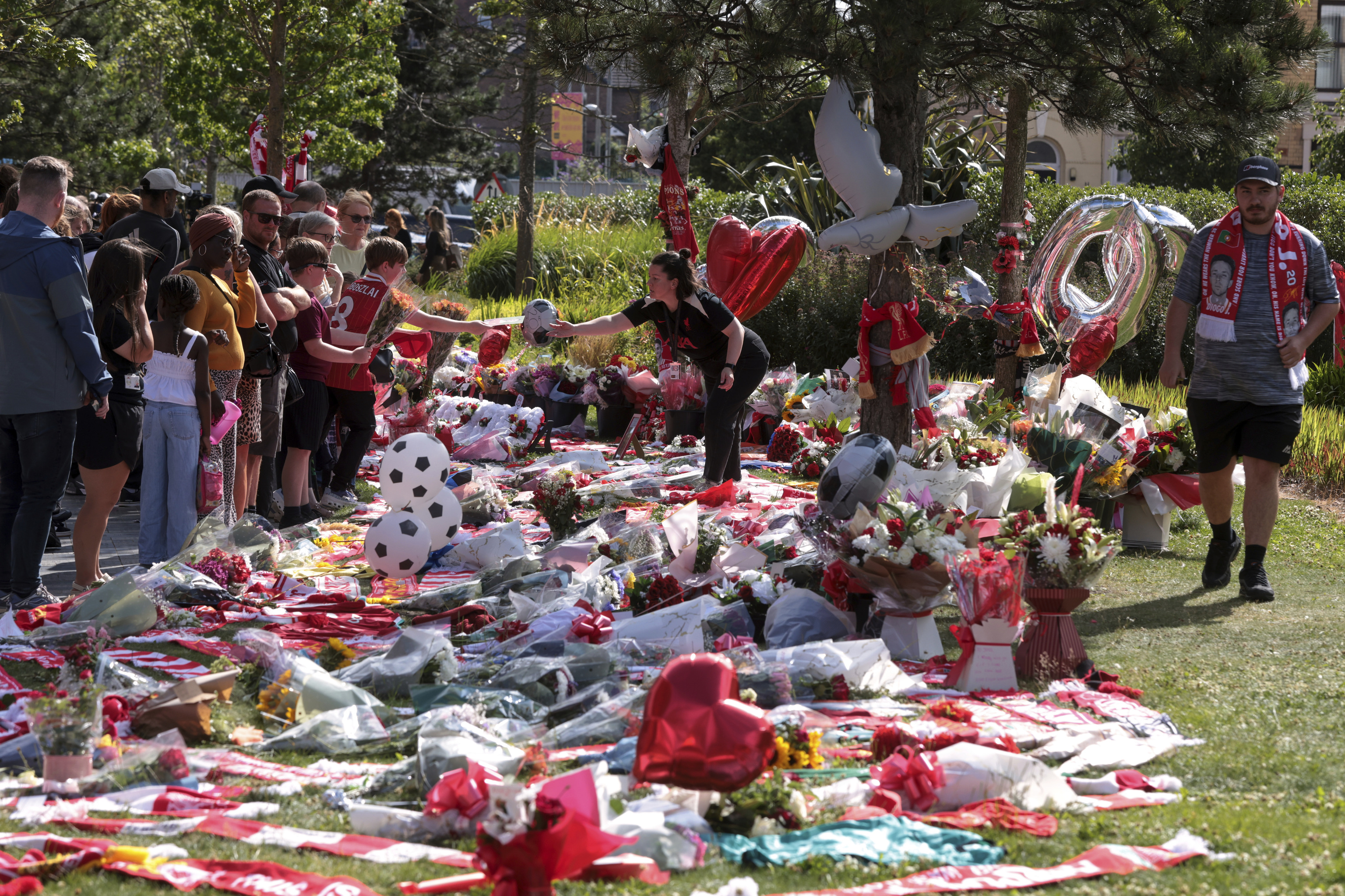It's 9:30 pm and the parents of Diogo José Teixeira da Silva, Diogo Jota, and André Silva leave the funeral home in Puebla de Sanabria. The mother can't hold back her tears, while the father stoically bears the tragedy that has shaken their family less than 24 hours ago. Along with them, the funeral cars of two young men, aged only 28 and 26, who played football, leave. Also accompanying the procession is Jota's representative, Jorge Mendes, the only one who offers a few words to the media gathered there. "I still can't believe it. This is very, very difficult," he says, only to later break down in tears as he gets into his vehicle.
It had been a tough afternoon in this small Zamoran town of just 1,100 inhabitants. From the funeral home, located at the foot of the medieval orchards, cries can be heard breaking the silence when a relative of the deceased comes out to talk on the phone or smoke a cigarette. They mourned the two young men for about five hours, while bureaucracy continued its slow process to repatriate the two footballers who died in a terrible accident at the fateful kilometer point 63.300 of the A-52.
In the small dirt parking lot behind the funeral home, several cars with Portuguese license plates are parked. They belong to the relatives who have come to grasp the tragedy. "We are waiting for the repatriation permit, we still don't know where the boys' funeral will be," one of the workers from the Portuguese funeral home told EL MUNDO, although it is already known that it will take place in Gondomar, the town where they grew up.
The instruction was being carried out by the Court of First Instance of Puebla de Sanabria, whose judge is Elena Rubio González. At the court's door, while a funeral home worker was leaving with the death certificates, some ladies were interested in what had happened. One of them mentioned being a fan of Atlético de Madrid, the club to which Diogo Jota belonged for two years, although he never managed to debut officially. "What a pity that these boys came to die here," she lamented.
It was an unfortunate accident being investigated by the Traffic Brigade of the Civil Guard, but it will take time because "the burned surface has eliminated many of the clues that could indicate the cause of the accident," as confirmed by the Armed Institute. The tragic event occurred at kilometer 63.300 of the road that connects Pontevedra and Benavente, in the direction of the Zamoran town.
By early afternoon, the remains of the accident were still visible. The skid marks in the right lane, a 50-meter-long mark, announced the tragedy about 100 meters later. At that point in the median, the remains of the Lamborghini Huracán were still scattered in a burnt surface area. A detached fin from the car that escaped the flames was the only remnant indicating the fluorescent green color of a car that ended up reduced to ashes, according to the Civil Guard. "Very frustrating," expressed a member of the local emergency service about the assistance they couldn't provide to the deceased.
The mortal remains of the two young men were transferred hours after the accident, once their death was confirmed, to the Forensic Anatomical Institute of Zamora for identification and postmortem analysis. The condition of the remains required a DNA test to confirm their identities, although the vehicle's license plate and personal belongings that were saved from the flames already pointed to the victims' identities.
While the world mourned the tragic loss of the Liverpool footballer and his brother, a player for Pennafiel in the Portuguese Second Division, the relatives impatiently awaited the permit that the Government Delegation of Valladolid had to grant to repatriate the young men's remains, which arrived late in the afternoon.
Diogo Jota and his brother were heading back to England via ferry from Santander, as reported by the Portuguese press. The Liverpool player had attended the wedding of national team colleague José Sa and Raquel Jacob, and another friend's wedding in northern Portugal. Before heading to the ferry, he had lunch with his wife, Rute Cardoso, and their three children, aged five, two, and a baby, in Leça de Palmeira, near the Portuguese beach of Matosinhos.
The plan was to stop in Benavente for the night and then head to the Cantabrian town to catch the ferry to England, driving straight to Liverpool where the footballer was starting the season with the Reds on Monday. Doctors had advised Jota, who had recently undergone lung surgery, against flying due to cabin pressurization issues. In the end, tragedy struck him and his brother on a road in sparsely populated Spain.
